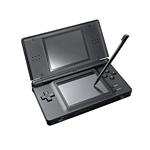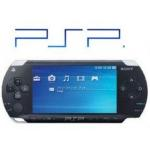psp vs nintendo ds lite

i am hooked at playing games on my daughter's PSP. very useful especially when waiting long queues in a doctors clinic or waiting for your lab tests to be done. i specifically enjoy playing: the sims castaway (i have only explored two islands, i think there's a third one), downstream panic (strategy game on saving the little fish from the big sharks i'm on level 42 already out of the 80 levels), loco roco (very colorful and simple game), etc.
i am actually looking into getting one for myself. that would make three psp's in one family. too much i suppose. so now i'm weighing my options between the PSP and the Nintendo DS Lite. of course, this is just wishful thinking at the moment since i have other priorities to consider. but i enjoy doing this, making my wishlist every now and then. its free to dream anyway.
checked the web for comparison and it seems that feature-wise PSP still dominates. well considering other factors than that, i believe it depends on your preference. since you will be the user anyway, best to consider what feature you will maximize. personally, i don't need the audio/video stuff since i already have this on my ipod. but having used the PSP i wonder if i can sacrifice the screen resolution i enjoy and also the games that i have learned to love playing.
so anyhoo, i would like to quote shopwiki.com for an apple to apple comparison of the two gaming gadgets:
Nintendo DS Lite
Design: The titanium DS clamshell design opens up to a dual-screen gaming experience, giving the system its name. The keypad setup, shoulder buttons, and directional button are similar to other Nintendo products, so existing Nintendo users should be very comfortable with it.
Size: The DS Lite is slimmer than the original DS model, although it's bulky when compared with the Game Boy Advance or the Game Boy Micro.
Screen Resolution: 256x192 pixels with 260,000 colors. More isn't always better. The two screens lack in resolution compared to the PSP, but they have minimal glare and the bottom screen is actually a touch screen. You can use a stylus or a thumb piece to navigate around it for writing messages, drawing in PictoChat, or other innovative, game-specific uses. The DS Lite also has adjustable brightness settings.
Media and Memory: The DS Lite has a dual-slot design for the game cartridges, meaning that it has backwards compatibility with the Game Boy Advance -- a big plus for your wallet if you already own lots of GBA games.
Connectivity: Wireless connection capability allows gamers to play with or against each other as well as chat and send messages via PictoChat. For direct connections (LAN play), you must be within 150ft. in open space, but only 30ft. when there are walls between. However, Nintendo has recently brought the DS online, allowing users to play against others via the Internet. All you need is a WiFi hotspot or wireless network in your home. Also, if you want to download new games and even use the device as a type of PDA, supposedly Nintendo will release V-pocket, making the DS palm-compatible in the very near future.
Audio: The audio on the DS makes a big difference with two large speakers that react like a surround sound setup would.
Battery Life: Great battery life on this baby, lasting 10 solid hours and then some, which is better than the PSP.
PSP
Design: The slick PSP resembles its full-size PlayStation counterpart except for the analog nub, which doesn't protrude like on a normal PS2 controller. The non clamshell design leaves the screen exposed, but you can buy a plastic screen guard.
Size: While the PSP doesn't have dual screens, it does have one massive 4.3" screen, which makes gaming on this device a real treat and not at all hard on the eyes. The system is slender but long, and thus tough to carry around in your pocket.
Screen Resolution: 480x272 pixel resolution and 16.77 million colors. While not impressive compared to a PS2, the PSP is pretty accomplished for Sony's first shot at a handheld system and it definitely outshines the DS. The screen doesn't have any touch functionality like the DS and it tends to attract smudges and fingerprints.
Media and Memory: The PSP requires UMD discs (they look like mini discs) for watching movies and playing games, but they aren't rewritable. You then need a separate Memory Stick to store games, game saves, music, photos, and video. The $250 PSP Value Pack comes with a 32Mb Stick, however, this is hardly enough to store more than one game save and a couple songs. Extra storage, such as a 1GB Stick ($70-$100) is expensive, but it's the only way to get the optimum use of the PSP's many features.
Connectivity: With built-in WiFi, you can access the Internet via the Web browser anywhere there is a wireless connection.
Audio: Sound quality is okay, but not comparable to listening to a dedicated MP3 device like an iPod.
Extras: The PSP does more than just play games. It can play movies, MP3s, M3Us, WAVs, and AAC-formatted files, but not songs downloaded from iTunes. It can also display photos that are stored on a memory chip (TIFFs, PNGs, JPGs, GIFs, and BMPs).
no need to rush on my preferred gaming gadget anytime soon, its just nice to dream on stuff like these. hmmm as some say in the Philippines, "tumatanda kang paurong". hehehe i would like to think not though. i would rather be referred to as "young at heart". hahaha... i wish!

